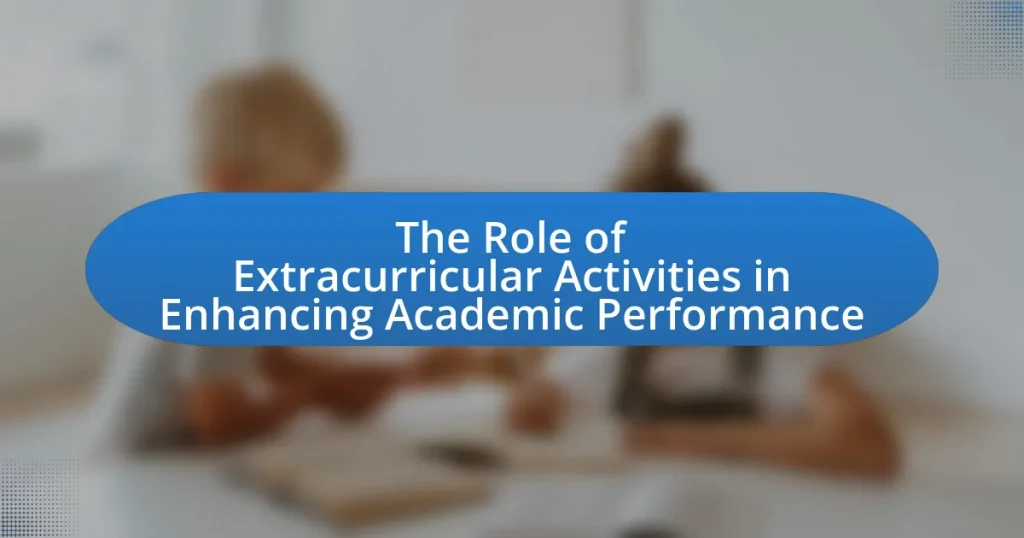Extracurricular activities are organized programs outside the academic curriculum that allow students to explore various interests and develop skills. These activities, including sports, clubs, music, and volunteer work, are linked to enhanced academic performance through the cultivation of essential skills such as teamwork, leadership, and time management. The article examines the differences between extracurricular and academic activities, the types of extracurriculars available, and the importance of these activities in fostering personal growth and improving academic outcomes. It also addresses the challenges students face in balancing these commitments and offers strategies for effective time management, highlighting the role of educators in guiding students toward beneficial extracurricular participation.

What are Extracurricular Activities?
Extracurricular activities are organized programs or events that take place outside of the standard academic curriculum, allowing students to engage in various interests and skills. These activities can include sports, clubs, music, art, and volunteer work, providing opportunities for personal development, social interaction, and skill enhancement. Research indicates that participation in extracurricular activities is linked to improved academic performance, as students develop time management skills, teamwork, and leadership abilities, which contribute positively to their educational experience.
How do Extracurricular Activities differ from Academic Activities?
Extracurricular activities differ from academic activities primarily in their focus and purpose. Extracurricular activities are non-academic pursuits that enhance personal development, social skills, and community engagement, such as sports, clubs, and arts, while academic activities are structured educational tasks aimed at achieving specific learning outcomes, including classes, homework, and exams. Research indicates that participation in extracurricular activities can lead to improved academic performance by fostering skills like teamwork, time management, and leadership, which are beneficial in academic settings.
What types of Extracurricular Activities are commonly available?
Common types of extracurricular activities include sports, music, drama, debate, student government, and community service. Sports programs often encompass team and individual sports, promoting physical fitness and teamwork. Music activities may involve band, choir, or orchestra, enhancing creativity and discipline. Drama clubs provide opportunities for acting and production, fostering confidence and collaboration. Debate teams develop critical thinking and public speaking skills. Student government allows students to engage in leadership and governance, while community service initiatives encourage civic responsibility and social awareness. These activities contribute to personal development and can positively influence academic performance by enhancing skills such as time management, teamwork, and leadership.
How do students choose which Extracurricular Activities to participate in?
Students choose extracurricular activities based on personal interests, social influences, and perceived benefits to their academic and personal development. Research indicates that students often select activities that align with their hobbies or career aspirations, as these choices can enhance their skills and knowledge relevant to their future goals. Additionally, peer recommendations and the desire for social interaction play significant roles in decision-making. A study published in the Journal of Educational Psychology found that students who engage in activities that resonate with their interests are more likely to experience improved academic performance and personal satisfaction.
Why are Extracurricular Activities important for students?
Extracurricular activities are important for students because they enhance personal development and academic performance. Participation in these activities fosters essential skills such as teamwork, leadership, and time management, which are critical for success in both academic and professional settings. Research conducted by the National Center for Education Statistics indicates that students involved in extracurricular activities tend to have higher GPAs and lower dropout rates compared to their peers who do not participate. This correlation suggests that engagement in such activities not only enriches the educational experience but also contributes positively to academic outcomes.
What skills do students develop through Extracurricular Activities?
Students develop a variety of skills through extracurricular activities, including leadership, teamwork, time management, and communication. Leadership skills are honed as students take on roles in clubs or sports teams, guiding peers and making decisions. Teamwork is fostered through collaborative projects and group activities, where students learn to work effectively with others towards a common goal. Time management skills are enhanced as students balance academic responsibilities with extracurricular commitments, teaching them to prioritize tasks efficiently. Communication skills are improved through presentations, discussions, and social interactions within these activities, enabling students to express their ideas clearly and confidently. These skills contribute significantly to their overall academic performance and personal development.
How do Extracurricular Activities contribute to personal growth?
Extracurricular activities contribute to personal growth by fostering essential life skills such as teamwork, leadership, and time management. Participation in these activities allows individuals to engage in diverse experiences that enhance their social interactions and emotional intelligence. For instance, a study published in the Journal of Educational Psychology found that students involved in extracurricular activities reported higher levels of self-esteem and improved interpersonal skills compared to those who did not participate. This evidence underscores the significant impact of extracurricular involvement on personal development, equipping individuals with competencies that are valuable both academically and in future career pursuits.

How do Extracurricular Activities enhance Academic Performance?
Extracurricular activities enhance academic performance by fostering essential skills such as time management, teamwork, and leadership. Participation in these activities encourages students to balance their academic responsibilities with other commitments, leading to improved organizational skills. Research conducted by the National Center for Education Statistics indicates that students involved in extracurricular activities tend to have higher GPAs and lower dropout rates compared to their peers who do not participate. Additionally, these activities provide opportunities for social interaction and networking, which can enhance motivation and engagement in academic pursuits.
What is the relationship between Extracurricular Activities and Academic Success?
Extracurricular activities positively influence academic success by enhancing students’ skills, motivation, and engagement. Participation in these activities fosters time management, teamwork, and leadership abilities, which are essential for academic achievement. Research indicates that students involved in extracurricular activities tend to have higher GPAs and better attendance rates. For instance, a study published in the Journal of Educational Psychology found that students who participated in extracurricular activities had an average GPA of 3.0 compared to 2.7 for those who did not engage in such activities. This correlation suggests that involvement in extracurriculars can lead to improved academic performance.
How do Extracurricular Activities improve time management skills?
Extracurricular activities improve time management skills by requiring participants to balance multiple commitments effectively. Engaging in sports, clubs, or volunteer work necessitates planning and prioritization, as students must allocate time for practice, meetings, and academic responsibilities. Research indicates that students involved in extracurricular activities often develop better organizational skills, as they learn to create schedules and set deadlines to meet various obligations. A study published in the Journal of Educational Psychology found that students who participated in extracurricular activities reported higher levels of time management proficiency compared to those who did not, highlighting the direct correlation between such activities and enhanced time management capabilities.
What impact do Extracurricular Activities have on student motivation?
Extracurricular activities significantly enhance student motivation by providing opportunities for engagement, skill development, and social interaction. Participation in these activities fosters a sense of belonging and accomplishment, which can lead to increased enthusiasm for academic pursuits. Research indicates that students involved in extracurricular activities often exhibit higher levels of motivation and commitment to their studies, as these activities can improve self-esteem and create a positive school environment. For instance, a study published in the Journal of Educational Psychology found that students who participated in extracurricular activities reported greater academic motivation and better grades compared to their peers who did not engage in such activities.
In what ways do Extracurricular Activities foster a positive learning environment?
Extracurricular activities foster a positive learning environment by promoting social interaction, enhancing student engagement, and developing essential life skills. These activities create opportunities for students to collaborate, which builds teamwork and communication skills, essential for academic success. Research indicates that students involved in extracurricular activities often exhibit higher levels of motivation and commitment to their studies, as participation can lead to improved self-esteem and a sense of belonging within the school community. Furthermore, studies show that students engaged in such activities tend to have better time management skills, which positively impacts their academic performance. For instance, a study published in the Journal of Educational Psychology found that students participating in extracurricular activities had higher GPAs compared to their peers who did not participate.
How do team-based Extracurricular Activities promote collaboration?
Team-based extracurricular activities promote collaboration by requiring participants to work together towards common goals, fostering communication and teamwork skills. These activities create an environment where individuals must share ideas, delegate tasks, and support one another, which enhances their ability to collaborate effectively. Research indicates that students involved in team-based activities, such as sports or group projects, develop stronger interpersonal skills and a sense of community, which are essential for successful collaboration in academic and professional settings. For instance, a study published in the Journal of Educational Psychology found that students who engaged in collaborative extracurricular activities showed improved group dynamics and problem-solving abilities, reinforcing the importance of teamwork in achieving collective objectives.
What role do Extracurricular Activities play in building school spirit?
Extracurricular activities play a crucial role in building school spirit by fostering a sense of community and belonging among students. Participation in these activities, such as sports, clubs, and arts, encourages teamwork and collaboration, which enhances relationships among peers. Research indicates that schools with active extracurricular programs report higher levels of student engagement and satisfaction, contributing to a positive school culture. For instance, a study published in the Journal of Educational Psychology found that students involved in extracurricular activities are more likely to feel connected to their school, leading to increased school pride and spirit.

What challenges do students face in balancing Extracurricular Activities and Academics?
Students face significant challenges in balancing extracurricular activities and academics, primarily due to time management issues. The demands of academic coursework, including assignments and exams, often conflict with the schedules of extracurricular commitments, leading to stress and potential burnout. Research indicates that students involved in multiple activities may struggle to allocate sufficient time for studying, which can negatively impact their academic performance. For instance, a study published in the Journal of Educational Psychology found that students who participated in numerous extracurricular activities reported lower grades compared to their peers who maintained a more balanced approach. Additionally, the pressure to excel in both areas can create anxiety, further complicating their ability to manage responsibilities effectively.
How can students effectively manage their time between Academics and Extracurricular Activities?
Students can effectively manage their time between academics and extracurricular activities by prioritizing tasks and creating a structured schedule. This involves identifying academic deadlines and extracurricular commitments, then allocating specific time blocks for studying, attending classes, and participating in activities. Research indicates that students who use time management techniques, such as the Eisenhower Matrix, report higher academic performance and lower stress levels. A study published in the Journal of Educational Psychology found that effective time management correlates with improved academic outcomes, demonstrating the importance of balancing both areas for overall success.
What strategies can help students prioritize their commitments?
Students can prioritize their commitments by utilizing time management techniques, such as creating a structured schedule and setting clear goals. A structured schedule allows students to allocate specific time blocks for academic work, extracurricular activities, and personal commitments, ensuring that they can balance their responsibilities effectively. Setting clear goals helps students identify what is most important, enabling them to focus on high-priority tasks first. Research indicates that students who engage in effective time management are more likely to experience improved academic performance and reduced stress levels, as evidenced by a study published in the Journal of Educational Psychology, which found that students who plan their time effectively achieve higher grades and have better overall well-being.
How can schools support students in balancing these responsibilities?
Schools can support students in balancing academic and extracurricular responsibilities by implementing structured schedules that prioritize time management. For instance, schools can create a calendar that allocates specific time slots for academic work, extracurricular activities, and personal time, helping students to visualize and manage their commitments effectively. Research indicates that students who engage in extracurricular activities often experience improved academic performance, as these activities can enhance skills such as time management and teamwork (Eccles & Barber, 1999). By providing resources such as workshops on time management and stress reduction, schools can further assist students in navigating their responsibilities, ultimately fostering a more balanced and productive educational experience.
What are the potential drawbacks of excessive involvement in Extracurricular Activities?
Excessive involvement in extracurricular activities can lead to negative impacts on academic performance and personal well-being. Students may experience increased stress and time management challenges, which can detract from their focus on academic responsibilities. Research indicates that students engaged in too many activities often report lower grades and higher levels of anxiety (Eccles & Barber, 1999). Additionally, overcommitment can result in burnout, reducing overall motivation and engagement in both academic and extracurricular pursuits.
How can overcommitment to Extracurricular Activities affect academic performance?
Overcommitment to extracurricular activities can negatively impact academic performance by reducing the time and energy available for studying and completing assignments. When students engage in too many activities, they often experience increased stress and fatigue, which can lead to lower grades and diminished focus on academic tasks. Research conducted by the National Center for Education Statistics indicates that students involved in multiple extracurricular activities may struggle to maintain a balance, resulting in a decline in their academic achievements.
What signs indicate that a student may be overwhelmed by their commitments?
Signs that indicate a student may be overwhelmed by their commitments include a noticeable decline in academic performance, increased absenteeism, and heightened stress levels. When students struggle to manage their time effectively due to excessive extracurricular activities, their grades may drop, reflecting their inability to keep up with academic demands. Additionally, frequent absences from classes can signal that a student is overwhelmed, as they may prioritize other commitments over their education. Increased stress can manifest through physical symptoms such as headaches or fatigue, as well as emotional signs like anxiety or irritability, indicating that the student is unable to cope with their workload.
What best practices can enhance the positive impact of Extracurricular Activities on Academic Performance?
Engaging in structured extracurricular activities can significantly enhance academic performance. Best practices include ensuring a balance between academic responsibilities and extracurricular commitments, as studies show that students who manage their time effectively tend to achieve higher grades. Additionally, selecting activities that align with academic interests can foster deeper learning; for instance, participation in science clubs can enhance understanding of scientific concepts, as evidenced by research from the Journal of Educational Psychology, which found that students involved in relevant extracurriculars scored higher on related assessments. Furthermore, promoting teamwork and leadership skills through group activities can improve critical thinking and problem-solving abilities, which are essential for academic success.
How can students select the right Extracurricular Activities for their academic goals?
Students can select the right extracurricular activities for their academic goals by aligning their interests and strengths with activities that enhance their skills and knowledge relevant to their desired career paths. For instance, students aiming for a career in science may benefit from joining science clubs or participating in research projects, as these experiences can deepen their understanding and provide practical applications of their studies. Research indicates that students involved in extracurricular activities related to their academic interests tend to achieve higher grades and develop better time management skills, as noted in a study published in the Journal of Educational Psychology, which found that participation in relevant activities can lead to improved academic performance and engagement.
What role do educators play in guiding students towards beneficial Extracurricular Activities?
Educators play a crucial role in guiding students towards beneficial extracurricular activities by providing information, support, and encouragement. They help students identify interests and strengths, which can lead to participation in activities that enhance skills and academic performance. Research indicates that students involved in extracurricular activities tend to have higher GPAs and better school attendance, as noted in a study by the National Center for Education Statistics, which found that participation in such activities correlates with improved academic outcomes. By fostering an environment that values these activities, educators contribute to the holistic development of students, preparing them for future challenges.


